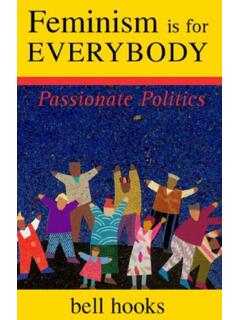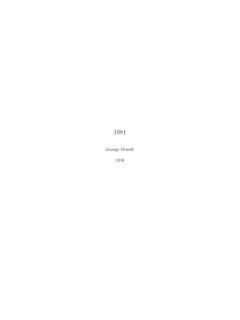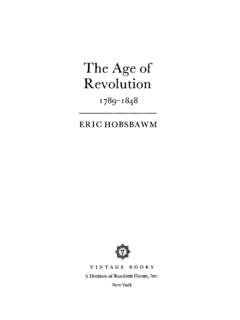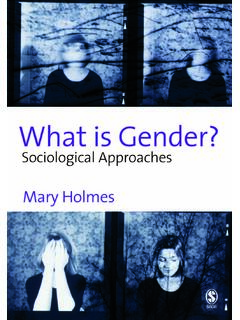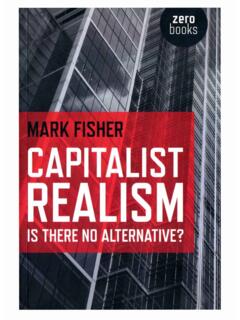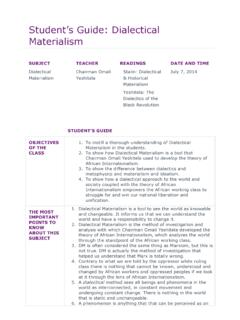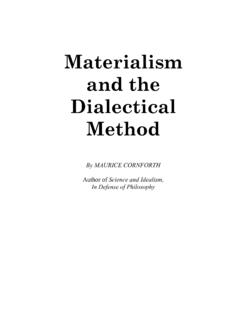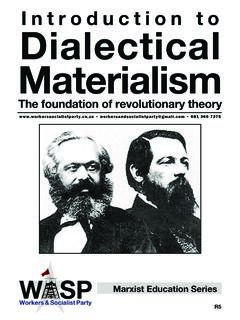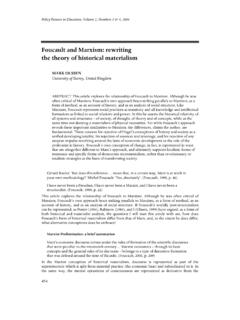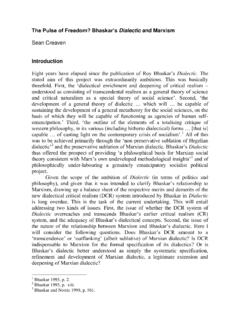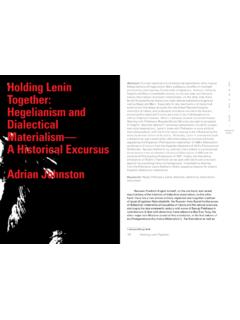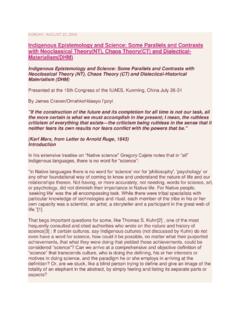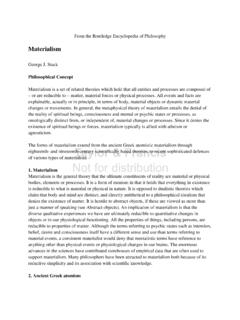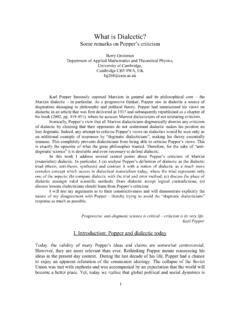Transcription of MARX VERSUS HISTORICAL MATERIALISM - Libcom.org
1 Chapter 2 marx VERSUS HISTORICAL MATERIALISMThis title is not merely intended to provoke. It also aims to draw attention to the directopposition between the body of theory traditionally known as Marxism , and the essenceof the work of Karl marx . If you try to discuss what marx was doing, without placing thestruggle for his conception of communism as a truly human society right at the centre ofthe picture, you surely falsify him. But that is precisely what Marxism does. Elsewhere[1], I have discussed the significance of this contrast for marx s work as a whole.
2 Here, Iconcentrate on showing how far the Marxist tradition has misread marx s conception believe it is vitally necessary for this discrepancy to be made explicit. The falsificationdeeply embedded in traditional accounts of marx s ideas, particularly of his understandingof HISTORICAL development, is a major obstacle to the regeneration of the revolutionarytradition. Marxism was an attempt to set up a philosophical doctrine, a philosophy ofhistory, which would explain how society made transitions from one stage to another.
3 Thismisunderstanding obscured what was crucial for everything marx did: the necessity forsocial consciousness to break out of its existing, fetishised forms to the level necessary forcommunism. This was not a matter of replacing one way of thinking with another, for itimplied what marx called the alteration of humans on a mass scale . [2] Instead of thisunderstanding of the revolutionary transformation of humanity, Marxism set up a systemof thinking which assigns to special people - radical philosophers, or social scientists, oreconomists, or the Marxist Party - the task of interpreting the world in various ways onbehalf of the rest of us.
4 In a quite separate operation, their conclusions could then becommunicated to the benighted basic notion of HISTORICAL MATERIALISM is well known. Plekhanov, one of its chieffounders, puts it like this:(I)t is the economic system of any people that determines its social structure, thelatter, in its turn, determining its political and religious structures and the like..(T)he fundamental cause of any social evolution, and consequently of any socialadvance, being the struggle man wages against Nature for his own existence.. marx s fundamental idea can be summed up as follows: 1) the production relationsdetermine all other relations existing among people in their social life.
5 2) theproduction relations are, in their turn, determined by the state of the productiveforces. [2]The basic principle of the materialist explanation of history is that men s thinkingis conditioned by their being, or that in the HISTORICAL process, the course of thedevelopment of ideas is determined, in the final analysis, by the course ofdevelopment of economic relations. [4]So, whatever the details of the mechanisms proposed by any of its many versions, HISTORICAL MATERIALISM claims to be a way of explaining history. It deals with the causes ofsocial evolution, stressing that history is governed by necessary laws, laws that are asimmutable as laws of Plekhanov talked about MATERIALISM , he wanted to conjure up those eighteenthcentury French thinkers like Holbach and Helvetius, who argued that human thoughts andactions had their roots in material conditions of the lives of individuals.
6 What they called matter , defined as what acts in one way or another on our senses , caused us to feel andthink, and so to act, in specific ways. Plekhanov and Kautsky thought that marx s materialist conception of history was an extension of this outlook to the explanation ofhistory. In his eagerness to extirpate all forms of idealism, one of their disciples, VI Lenin,was led to write about the analysis of material social relations .. that take shape withoutpassing through man s consciousness . [5] HISTORICAL materialists explain the transition from one stage of social development toanother by the conflict between productive forces and social relations.
7 Some practitionershere take productive forces to mean a discrete mixture of two things: means of productionplus labour-power. [6] The question they ignore is why are they two? Here are the twoaspects of social life, one the human power to produce, the other the social connectionswithin which this power operates. But why are they separate? Why are they at war witheach other?If you explain something, you have to stand outside it. A materialist explanationinvolves hypotheses about how some things external to the explainer cause other externalthings to happen.
8 Here is the basic paradox: when the object to be explained is humanhistory, it includes the wills and consciousnesses of the HISTORICAL agents, not to mentionthe will and consciousness of the explainer. In general, they considered HISTORICAL forces asdetermining the changes in social forms, as though history had nothing to do with thestrivings of living men and women. Many devotees of HISTORICAL MATERIALISM believedstrongly in a socialist future and devoted their lives to struggling for it. Did they standoutside the causal process they imagined governed history, somehow immune to itsinfluences?
9 Some might think that Plekhanov s statement of HISTORICAL MATERIALISM does not give a fairaccount of the theory. What about other, more sophisticated Marxisms ? However, I thinkthat Plekhanov, for all his crudity, actually gets to the heart of the matter. At any rate, hehas the not inconsiderable merit of stating clearly just what he means. Since his opinionsformed the basis for the outlook of Lenin and his followers, and therefore came topredominate in the Communist International, their influence on all later work isundeniable.
10 When Stalin produced his obscene caricature, dialectical and HistoricalMaterialism, in 1938, Plekhanov certainly provided him with his model, one well adaptedto bureaucratic , while not everybody using the term HISTORICAL MATERIALISM means exactly the samething by it, they all have at least one thing in common: they each have in mind a way ofexplaining history. This also applies to the various schools of Western Marxism , whooften use the expression, although, they lack Plekhanov s virtue of spelling out just whatthey think it means.

